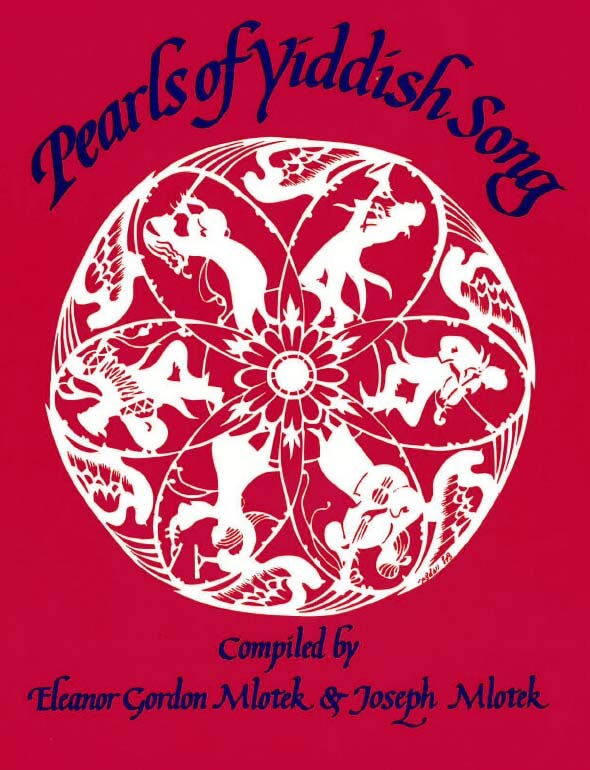Poem by H. Leivick (1888-1982), written in 1934 as a closing theme to Leivick’s drama The Poet Became Blind, about the Yiddish poet Morris Rosenfeld. Music by Sholom Secunda (1894-1974) was published in New York, 1943.

The world enfolds me with barbed fingers and carries me to the fire and carries me to the pyre.
I burn and I burn and I am not consumed.
I rise once again and stride on.
I pass through factories and fall under the wheel.
I blew up the engines with renewed strength.
I lie down like a new foundation
I rise once again and stride on.
I pass on in a horse’s harness
And am whipped by a raging driver.
Like a sharp plough I till the earth
I rise once again and stride on.
I sow my songs like kernels.
They blossom, they grow like wheat and like plants.
And I lie alone like a twisted thorn — rise once again and stride on.
I live in a prison,
I blow up the cell.
The freed man walks over me towards his freedom.
And he leaves me lying in blood on the threshold — I rise once again and stride on.
My clothes are bloody — I can barely drag my feet.
I came cleansed of the last suffering.
I come to a house and collapse on the steps
I rise once again and stride on.
Di velt nemt mikh arum mit shtekhike hent,
Un trogt mikh tsum fayer, un trogt mikh tsum shayter;
Ikh bren un ikh bren un ikh ver nit farbrent, —
Ikh heyb zikh oyf vider un shpan avek vayter.
Ikh shpan durkh fabrikn un fal untern rod,
Ikh rays oyf di damfn mit kraft mit banayter,
Ikh leyg zikh avek, vi a nayer yesod, —
Ikh heyb zikh oyf vider un shpan avek vayter.
Ot shpan ikh zikh ayn in geshpan fun a ferd,
Un iber mir baytsht a dertsornter rayter;
Vi an aker a sharfer ikh grob durkh di erd, —
Ikh heyb zikh oyf vider un shpan avek vayter.
Ikh zey mayne lider, vi kerner men zeyt,
Zey shprotsn, zey vaksn, vi zangen un krayter;
Un ikh aleyn lig vi a dorn fardreyt, —
Ikh heyb zikh oyf vider un shpan avek vayter.
Ikh voyn in a tfise, ikh rays oyf di tsel,
Es tret iber mir tsu zayn glik der bafrayter,
Un mikh lozt er lign in blut bay der shvel, —
Ikh heyb zikh oyf vider un shpan avek vayter.
In blut mayne kleyder, — di fis koym ikh shlep,
Ikh kum mit a libshaft fun letstn gelayter;
Ikh kum tsu a shtibl, ikh fal oyf di trep —
Ikh heyb zikh oyf vider un shpan avek vayter.
די װעלט נעמט מיך אַרום מיט שטעכיקע הענט,
און טראָגט מיך צום פֿײַער, און טראָגט מיך צום שײַטער;
איך ברען און איך ברען און איך װער ניט פֿאַרברענט, —
איך הײב זיך אױף װידער און שפּאַן אַװעק װײַטער.
איך שפּאַן דורך פֿאַבריקן און פֿאַל אונטערן ראָד,
איך רײַס אױף די דאַמפֿן מיט קראַפֿט מיט באַנײַטער,
איך לײג זיך אַװעק, װי אַ נײַער יסוד, —
איך הײב זיך אױף װידער און שפּאַן אַװעק װײַטער.
אָט שפּאַן איך זיך אײַן אין געשפּאַן פֿון אַ פֿערד,
און איבער מיר בײַטשט אַ דערצאָרנטער רײַטער;
װי אַן אַקער אַ שאַרפֿער איך גראָב דורך די ערד —
איך הײב זיך אױף װידער און שפּאַן אַװעק װײַטער.
איך זײ מײַנע לידער, װי קערנער מען זײט,
זײ שפּראָצן, זײ װאַקסן, װי זאַנגען און קרײַטער;
און איך אַלײן ליג װי אַ דאָרן פֿאַרדרײט, —
איך הײב זיך אױף װידער און שפּאַן אַװעק װײַטער.
איך װױן אין אַ תּפֿיסה, איך רײַס אױף די צעל,
עס טרעט איבער מיר צו זײַן גליק דער באַפֿרײַטער,
און מיך לאָזט ער ליגן אין בלוט בײַ דער שװעל, —
איך הײב זיך אױף װידער און שפּאַן אַװעק װײַטער.
אין בלוט מײַנע קלײדער, — די פֿיס קױם איך שלעפּ,
איך קום מיט אַ ליבשאַפֿט פֿון לעצטן געלײַטער;
איך קום צו אַ שטיבל, איך פֿאַל אױף די טרעפּ. . .
איך הײב זיך אױף װידער און שפּאַן אַװעק װײַטער.
Song Title: Eybik

First published in 1988 as Pearls of Yiddish Song: Favorite Folk, Art and Theatre Songs, this anthology contains 115 songs. Some material had never been published, while others, included in rare song collections or sheet music, were largely inaccessible. The songs presented reflect Jewish life in Eastern Europe and the United States and depict childhood, love, family celebrations, poverty, work and struggle. There are also songs from the Hasidic and Maskilic movements, songs of Zion and of America, as well as songs from the Yiddish theater.
The title of this anthology derives from the weekly two-page feature column “Pearls of Yiddish Poetry,” which the compilers Yosl and Chana Mlotek initiated in 1970 in the Yiddish newspaper Der Forvertz (the Yiddish Daily Forward). Hundreds of readers from around the world — including authors, composers, singers, actors — became co-participants in this collective folk project and recalled melodies, lines, fragments, stanzas and their variants of songs, poems, and plays which they had heard in their youth. At first, readers sent in only written material. Later, they also taped songs on cassettes, many of whose melodies had, until then, never been recorded. They also identified and supplied missing information regarding lyricists, poets, and composers and described the circumstances surrounding the songs’ origins, their dissemination, diffusion and impact.